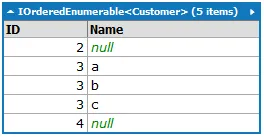使用反射来获取字符串属性名称到PropertyInfo的映射。然后使用PropertyInfo构建表达式树,动态构造所有的排序方式。一旦有了表达式树,将其编译为委托(例如Func, IEnumerable>),将_list参数传递给该委托,它将作为另一个可枚举对象给出排序结果。
要获取Enumerable上的泛型方法的反射信息,请查看此帖子中的答案:
Get a generic method without using GetMethods
public static class Helper
{
public static IEnumerable<T> BuildOrderBys<T>(
this IEnumerable<T> source,
params SortDescription[] properties)
{
if (properties == null || properties.Length == 0) return source;
var typeOfT = typeof (T);
Type t = typeOfT;
IOrderedEnumerable<T> result = null;
var thenBy = false;
foreach (var item in properties
.Select(prop => new {PropertyInfo = t.GetProperty(prop.PropertyName), prop.Direction}))
{
var oExpr = Expression.Parameter(typeOfT, "o");
var propertyInfo = item.PropertyInfo;
var propertyType = propertyInfo.PropertyType;
var isAscending = item.Direction == ListSortDirection.Ascending;
if (thenBy)
{
var prevExpr = Expression.Parameter(typeof (IOrderedEnumerable<T>), "prevExpr");
var expr1 = Expression.Lambda<Func<IOrderedEnumerable<T>, IOrderedEnumerable<T>>>(
Expression.Call(
(isAscending ? thenByMethod : thenByDescendingMethod).MakeGenericMethod(typeOfT, propertyType),
prevExpr,
Expression.Lambda(
typeof (Func<,>).MakeGenericType(typeOfT, propertyType),
Expression.MakeMemberAccess(oExpr, propertyInfo),
oExpr)
),
prevExpr)
.Compile();
result = expr1(result);
}
else
{
var prevExpr = Expression.Parameter(typeof (IEnumerable<T>), "prevExpr");
var expr1 = Expression.Lambda<Func<IEnumerable<T>, IOrderedEnumerable<T>>>(
Expression.Call(
(isAscending ? orderByMethod : orderByDescendingMethod).MakeGenericMethod(typeOfT, propertyType),
prevExpr,
Expression.Lambda(
typeof (Func<,>).MakeGenericType(typeOfT, propertyType),
Expression.MakeMemberAccess(oExpr, propertyInfo),
oExpr)
),
prevExpr)
.Compile();
result = expr1(source);
thenBy = true;
}
}
return result;
}
private static MethodInfo orderByMethod =
MethodOf(() => Enumerable.OrderBy(default(IEnumerable<object>), default(Func<object, object>)))
.GetGenericMethodDefinition();
private static MethodInfo orderByDescendingMethod =
MethodOf(() => Enumerable.OrderByDescending(default(IEnumerable<object>), default(Func<object, object>)))
.GetGenericMethodDefinition();
private static MethodInfo thenByMethod =
MethodOf(() => Enumerable.ThenBy(default(IOrderedEnumerable<object>), default(Func<object, object>)))
.GetGenericMethodDefinition();
private static MethodInfo thenByDescendingMethod =
MethodOf(() => Enumerable.ThenByDescending(default(IOrderedEnumerable<object>), default(Func<object, object>)))
.GetGenericMethodDefinition();
public static MethodInfo MethodOf<T>(Expression<Func<T>> method)
{
MethodCallExpression mce = (MethodCallExpression) method.Body;
MethodInfo mi = mce.Method;
return mi;
}
}
public static class Sample
{
private static void Main()
{
var data = new List<Customer>
{
new Customer {ID = 3, Name = "a"},
new Customer {ID = 3, Name = "c"},
new Customer {ID = 4},
new Customer {ID = 3, Name = "b"},
new Customer {ID = 2}
};
var result = data.BuildOrderBys(
new SortDescription("ID", ListSortDirection.Ascending),
new SortDescription("Name", ListSortDirection.Ascending)
).Dump();
}
}
public class Customer
{
public int ID { get; set; }
public string Name { get; set; }
}
示例在 LinqPad 中的结果如下所示:

